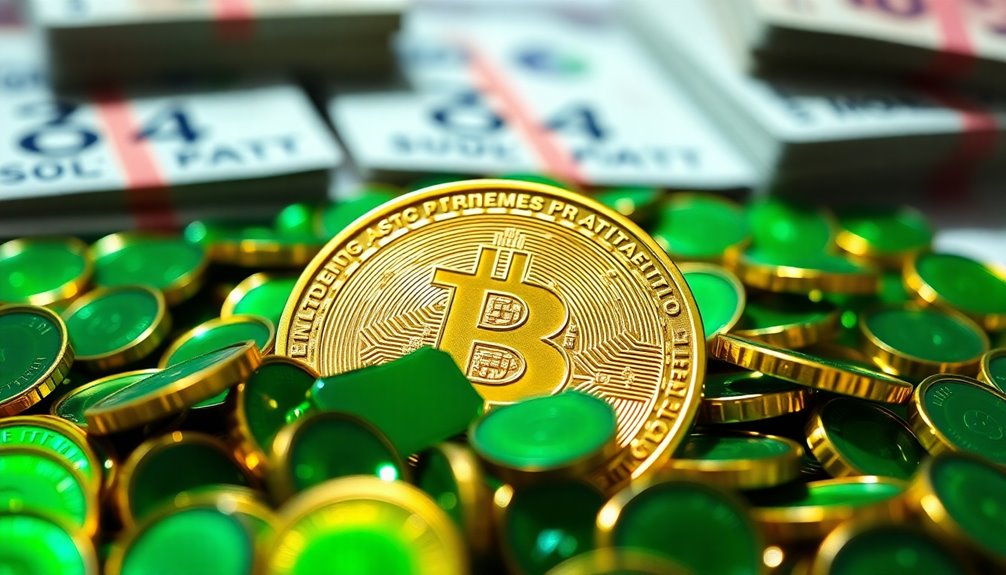The Coinbase CEO's call for a global Bitcoin reserve is a game changer for how countries could manage digital assets. By encouraging nations to hold Bitcoin similarly to how central banks hold gold, he's pushing for financial stability in a decentralized world. Countries like El Salvador and the UK are already starting to accumulate Bitcoin, while proposed regulations aim to enhance transparency. This move could significantly impact investment strategies and policies on crypto assets worldwide. To understand the broader implications and the latest developments in this ongoing initiative, you're encouraged to stay informed.
Key Takeaways
- The Coinbase CEO advocates for a global Bitcoin reserve to enhance financial stability and reduce reliance on traditional monetary policies.
- Establishing a Bitcoin reserve would allow financial authorities to manage Bitcoin similarly to gold reserves, promoting long-term value retention.
- Senator Lummis supports the idea, proposing a plan to accumulate one million Bitcoins within five years to bolster national reserves.
- Countries like El Salvador are already implementing Bitcoin accumulation strategies, setting examples for global adoption of cryptocurrency reserves.
- Increased regulatory clarity and oversight can facilitate the establishment of Bitcoin reserves, fostering wider acceptance among world leaders and financial institutions.
Global Bitcoin Reserve Advocacy

Many believe that establishing a global Bitcoin reserve could reshape the financial landscape. By creating a strategic reserve, financial authorities can hold Bitcoin similarly to how central banks manage gold and foreign currency. This reserve would help address balance of payments needs and could stabilize exchange rates. Furthermore, the security risks associated with digital payments could be mitigated by using Bitcoin as a reserve asset.
Unlike traditional reserves, Bitcoin's decentralized nature protects it from monetary policy interventions, making it an attractive hedge against inflation. Proposals, such as Senator Cynthia Lummis' plan to accumulate a million Bitcoins over five years, highlight its potential as a reserve asset. Additionally, countries like El Salvador and the UK have begun accumulating Bitcoin, demonstrating a growing acceptance of this digital asset.
With Bitcoin's market capitalization exceeding $2 trillion, more institutions and governments are recognizing its value. The next decade will be crucial in determining Bitcoin's role in global finance.
Regulatory Changes Impacting Cryptocurrency

As the financial landscape evolves with the push for global Bitcoin reserves, regulatory changes are rapidly reshaping the cryptocurrency environment.
You'll notice that frameworks like the European Union's MiCA regulation and the OECD's Crypto-Asset Reporting Framework are setting new standards for oversight and tax compliance. Additionally, the growing urgency for regulation is reflected in the International Organization of Securities Commissions (IOSCO)'s issuance of recommendations aimed at ensuring consistency across crypto markets.
In the U.S., both federal and state-level regulations are developing, with states like Wyoming and Florida leading the charge.
Countries like Brazil and Britain are also implementing their own regulations to supervise crypto assets and protect consumers.
As these regulations tighten, especially regarding tax compliance and reporting, you'll find greater transparency in the market, ultimately influencing how you interact with cryptocurrencies in this dynamic landscape.
Bitcoin Price Volatility Analysis

While Bitcoin's allure remains strong, its price volatility can be a double-edged sword for investors. Historically low volatility has recently set the stage for potential price surges, as seen in the past. Interestingly, Bitcoin's realized volatility has shown a gradual decline over time, making it less volatile compared to many traditional assets during market crashes. This trend of declining volatility is significant as it often precedes substantial price increases, providing a potentially fruitful environment for investors. You might notice that, despite a decline in volatility, demand continues to rise, driven by factors like fixed supply and economic uncertainty. However, be cautious—regulatory changes and speculative trading can lead to sharp price swings. Understanding these dynamics can help you navigate the unpredictable waters of Bitcoin investment more effectively.
Corporate Investment Strategies

Corporate investment strategies in the cryptocurrency space have evolved significantly, offering various avenues for businesses looking to capitalize on digital assets.
You might consider direct investments by purchasing Bitcoin, Ether, or various altcoins. Engaging in crypto derivatives or investing in ETFs that hold cryptocurrencies can also be effective.
Alternatively, you can opt for indirect investments by backing centralized exchanges like Coinbase or crypto-focused hardware manufacturers such as NVIDIA. Understanding the importance of diversification in your investment portfolio can help mitigate risks associated with volatile assets.
Many firms are adopting a long-term approach with treasury reserves, following MicroStrategy's lead by holding substantial Bitcoin amounts for capital preservation. Volatility in cryptocurrency prices presents both risks and opportunities, making it crucial to assess market conditions regularly.
Understanding the regulatory landscape ensures you manage risks while adapting to the evolving market, ultimately positioning your company for success in this dynamic environment.
Government Cryptocurrency Policy Shifts

The landscape of cryptocurrency is rapidly changing, not just for businesses but also at the government level.
With President-elect Trump planning an executive order to prioritize crypto, you can expect a surge in legislative initiatives across the country. States will likely introduce crypto-friendly bills in 2025, fueled by lobbying efforts and the growing influence of the industry. Additionally, anticipation is building around increased government and central bank purchases of Bitcoin in 2025, signaling a shift in how nations view digital currencies.
Meanwhile, Sen. Cynthia Lummis' federal bitcoin reserve bill could reshape how states approach digital assets. As governments eye bitcoin as a strategic asset, they're also considering public pension fund investments.
However, the ongoing legal battles, especially between the SEC and Coinbase, underline the urgent need for clear regulatory frameworks to define digital assets' roles in the economy.
Global Adoption Trends Emerging

As global interest in cryptocurrency grows, emerging markets are leading the charge in adoption trends. Countries like India and Indonesia are at the forefront, with India boasting 75 million users, representing 20.60% of its population. Regulatory clarity in Japan and Germany further supports this trend, encouraging more businesses to embrace crypto. Notably, Nigeria and Kenya are witnessing rapid increases in adoption, driven by a young, tech-savvy population eager to explore beyond traditional finance. In fact, lower-middle-income nations are currently leading in crypto adoption growth, showcasing a remarkable shift in financial engagement. With Bitcoin's price predicted to soar, global confidence in crypto strengthens. As stablecoins and DeFi activities rise across lower-income regions, you can see how these trends are reshaping the financial landscape and paving the way for broader acceptance of cryptocurrencies worldwide.
Frequently Asked Questions
How Does a Global Bitcoin Reserve Benefit Individual Investors?
A global Bitcoin reserve can significantly benefit you as an individual investor. Increased demand from national reserves could drive Bitcoin prices up, enhancing your asset's value.
It also offers portfolio diversification, protecting you against inflation and economic downturns. With stronger market confidence and clearer regulations, you'll find a more stable investment environment.
What Are the Environmental Impacts of Increased Bitcoin Mining for Reserves?
If bitcoin mining were a country, it'd consume enough energy to power entire nations!
This skyrocketing demand leads to staggering carbon emissions, generating 86 megatons annually.
Plus, you're left with heaps of electronic waste from those short-lived mining rigs.
The water and land usage isn't pretty either, causing pollution and habitat destruction.
While some efforts promote renewable energy, the environmental toll is hard to ignore as the industry grapples with sustainability.
Can Bitcoin Reserves Influence Traditional Fiat Currency Values?
Yes, Bitcoin reserves can influence traditional fiat currency values. By holding Bitcoin, countries might gain economic independence, but they also face volatility risks that could undermine stability.
If exchange rates fluctuate significantly, domestic prices could become unstable. However, if integrated wisely, Bitcoin might serve as a hedge against inflation and improve transaction efficiency.
Ultimately, the impact depends on how well countries manage these digital assets within their economic frameworks.
What Risks Do Governments Face in Adopting Bitcoin Reserves?
When you think of Bitcoin reserves, consider the rollercoaster ride of risks.
Governments face significant challenges, from market volatility that can destabilize fiscal planning to security threats like hacks and lost keys.
The tangled web of regulatory uncertainty complicates matters further, potentially leading to public outrage if taxpayer funds are involved.
With energy-intensive mining and wealth concentration concerns, adopting Bitcoin reserves isn't just a financial decision; it's a political tightrope walk.
How Can Citizens Participate in Global Bitcoin Reserve Initiatives?
You can participate in global Bitcoin reserve initiatives by educating yourself about Bitcoin and its implications.
Stay informed on policies, advocate for pro-crypto legislation, and engage with online cryptocurrency communities.
Reach out to your representatives to express support, and get involved with organizations promoting cryptocurrency adoption.
Prioritize understanding custody options and cybersecurity to protect your investments.
Lastly, encourage transparency and regular updates from policymakers to build trust in these initiatives.
Conclusion
So, as the Coinbase CEO rallies world leaders to stash their cash in Bitcoin, you've got to wonder—what's next? Maybe they'll start trading in magic beans or unicorn futures, right? With all the regulatory changes and price rollercoasters, investing in Bitcoin seems more like a game of roulette than a sound strategy. But hey, if the world's embracing digital gold, who needs stable economies anyway? Just sit back, watch the chaos, and enjoy the ride!









